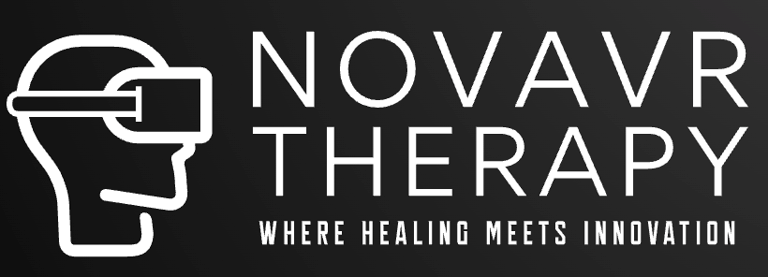Step into the future of counselling & psychotherapy in Ottawa with NovaVR’s immersive VR therapy. Call today for a free consultation: (613) 501- 2175
Virtual Therapy for Remote Ottawa Teams: A Game-Changer for Workplace Wellness
Virtual therapy, also known as teletherapy or online counseling, refers to psychological support delivered through digital platforms such as video conferencing, phone calls, or messaging applications. This innovative approach to mental health care has gained significant traction in recent years, particularly within remote work environments like those of teams in Ottawa. With the rapid transition to telecommuting due to the COVID-19 pandemic, the necessity for adequate mental health support has become increasingly evident.
Athem Houssein
4/9/20256 min read


Understanding Virtual Therapy and Its Importance
Virtual therapy, also known as teletherapy or online counseling, refers to psychological support delivered through digital platforms such as video conferencing, phone calls, or messaging applications. This innovative approach to mental health care has gained significant traction in recent years, particularly within remote work environments like those of teams in Ottawa. With the rapid transition to telecommuting due to the COVID-19 pandemic, the necessity for adequate mental health support has become increasingly evident.
In a remote work setting, employees often face unique challenges that can adversely affect their mental well-being. Issues such as social isolation, increased work-related stress, and the blurring of work-life boundaries contribute to a heightened risk of anxiety and depression among remote workers. Virtual therapy serves as a crucial resource, providing accessible mental health support that is tailored to the needs of individuals working from home. It helps employees navigate the emotional challenges associated with remote work, thereby fostering a healthier work culture.
Moreover, virtual therapy eliminates many barriers associated with traditional in-person counseling, such as travel time and scheduling difficulties. For Ottawa-based teams, employees can access therapeutic services from the comfort of their homes, creating a more convenient and comfortable environment that encourages openness. This flexibility not only promotes engagement but also reinforces the commitment of organizations to prioritize mental wellness.
As workplaces evolve and adapt to remote operations, the importance of mental health support through virtual therapy cannot be overstated. By addressing the challenges faced by remote workers, virtual therapy helps mitigate feelings of isolation and anxiety, ultimately contributing to increased employee morale and productivity. Embracing this modern approach is vital for organizations seeking to enhance overall employee well-being in an increasingly digital landscape.
Benefits of Virtual Therapy for Remote Teams in Ottawa
Virtual therapy has emerged as a transformative solution for remote teams in Ottawa, offering a multitude of benefits that can significantly enhance workplace wellness. One of the most notable advantages is the increased accessibility to mental health resources. Employees can easily connect with licensed therapists from the comfort of their homes, eliminating the need for lengthy commutes and ensuring that help is available regardless of geographical limitations. This accessibility is especially crucial for remote workers who may feel isolated, as it provides them with a direct link to professional support when they need it.
Another significant benefit of virtual therapy is the convenience of remote sessions. Flexible scheduling allows employees to engage in therapeutic practices at times that suit their individual needs, whether during a lunch break or in the evening after work hours. This adaptability not only encourages participation but also ensures that employees do not have to sacrifice their professional responsibilities to prioritize their mental well-being. Furthermore, the ability to access therapy through various digital platforms—such as video calls, chat, or phone—caters to diverse preferences and comfort levels, making it an inclusive option for all team members.
Virtual therapy also enables the customization of therapeutic approaches to align with individual schedules and specific personal needs. This tailored experience fosters a deeper connection between employees and their therapists, facilitating more productive sessions that focus on relevant challenges. As a result, employees often experience enhanced engagement and productivity, as they feel supported and understood by their professionals. This holistic focus on mental health not only positively influences individual well-being but also cultivates a more positive work environment overall, contributing to increased workplace satisfaction and morale within remote teams in Ottawa.
Implementing Virtual Therapy Programs in Your Workplace
As remote work becomes increasingly prevalent among Ottawa teams, implementing virtual therapy programs can significantly enhance workplace wellness. To ensure such programs are effective, organizations must take several key considerations into account. First and foremost, selecting qualified therapists is crucial. Organizations should seek licensed professionals with experience in remote therapy settings and relevant experience in addressing common workplace stresses, as this can greatly impact employee engagement with the services offered.
Next, establishing a supportive company culture is vital. Employees are more likely to utilize virtual therapy services when they feel that mental well-being is prioritized by the organization. Management should actively communicate the importance of mental health, fostering an environment where seeking help is normalized rather than stigmatized. To reinforce this culture, leadership can share their own mental wellness journeys, illustrating that everyone can benefit from support, regardless of their role within the organization.
Additionally, ensuring employee privacy and confidentiality is fundamental in successfully implementing virtual therapy programs. Organizations must choose platforms that comply with privacy regulations and utilize secure systems to protect sensitive information. Clear policies should be in place regarding how data will be managed and who will have access to it, as this transparency will help build trust between employees and the organization.
Lastly, promoting virtual therapy resources effectively within the workplace is essential to maximizing participation. Organizations should consider using multiple communication channels, such as emails, intranet postings, and team meetings, to disseminate information about the services available. Moreover, offering incentives for usage, such as wellness days or workshops on effective mental health practices, can encourage employees to take advantage of the support available. By addressing these critical aspects, organizations in Ottawa can successfully implement virtual therapy programs, fostering a healthier, more resilient workforce.
Real-Life Success Stories and Testimonials
As organizations continue to adapt to the challenges posed by remote work, many Ottawa companies have turned to virtual therapy as an integral part of their employee wellness programs. One notable success story comes from a mid-sized tech firm that implemented virtual therapy sessions, resulting in a significant reduction in employee burnout rates. According to their HR manager, the integration of virtual therapy not only provided employees with easier access to mental health resources but also fostered an environment of openness regarding mental well-being. Two months after launching the program, surveys indicated a 40% decrease in reported stress levels among employees.
Another example is that of a financial services company, where virtual therapy was incorporated as an employee benefit. After just six months of offering weekly online therapy sessions, the company noted an increase in overall morale and productivity. Employees reported feeling more connected and supported in their roles, which translated into improved collaboration within teams. A marketing executive shared in a testimonial that the accessibility of virtual therapy made it easier to prioritize mental health, allowing her to tackle work challenges with greater resilience and focus.
Moreover, a nonprofit organization in Ottawa tailored its wellness initiatives by integrating virtual therapy to address the unique stresses faced by its staff during uncertain times. Based on internal feedback, 85% of employees indicated that the virtual therapy sessions contributed to a more positive team dynamic, with many expressing that they felt more comfortable sharing their concerns. This open dialogue has led to improved communication and stronger relationships among team members.
These examples highlight the transformative impact that virtual therapy can have in the workplace. By prioritizing employee mental health and well-being through these innovative programs, organizations are not only enhancing individual resilience but also creating healthier, more collaborative workplaces.


Athem Houssein
SOCIAL WORKER (MSW)
Rebecca Bates
SOcial Worker (MSW)
DeRoux Jones
Psychotherapist. (q)
Emily Light
Psychotherapist. (q)
Show You Care 💚
Whether you're a business, nonprofit, school, or agency, this is a simple, meaningful way to support mental health — without adding administrative burden. We'll provide everything you need to launch the benefit quickly and effectively.
You're Invited to Join the NovaVR Corporate Affiliate Program
Support your team’s mental well-being with exclusive access to discounted therapy services.
✅ Click the box below to confirm your interest and receive your corporate access package.


